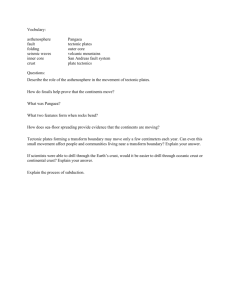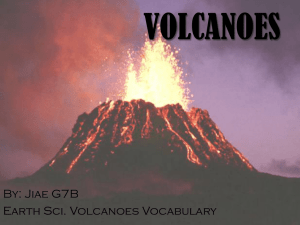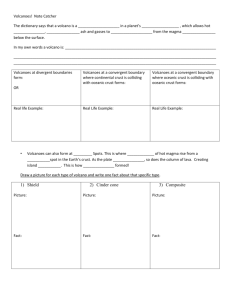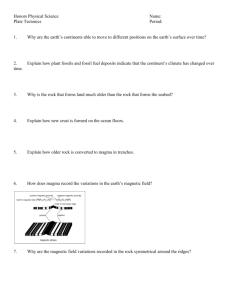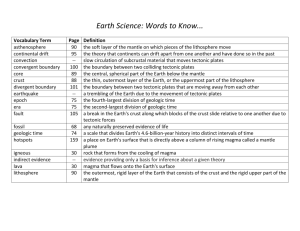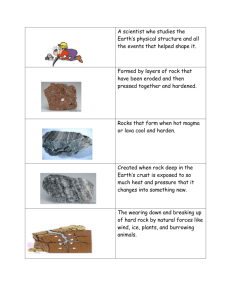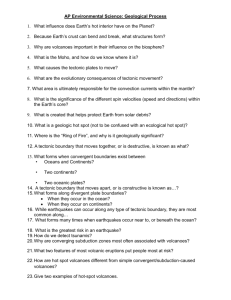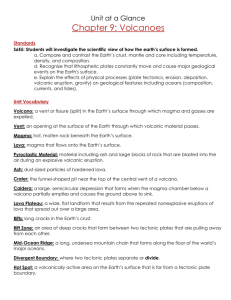oceanic eruption
advertisement
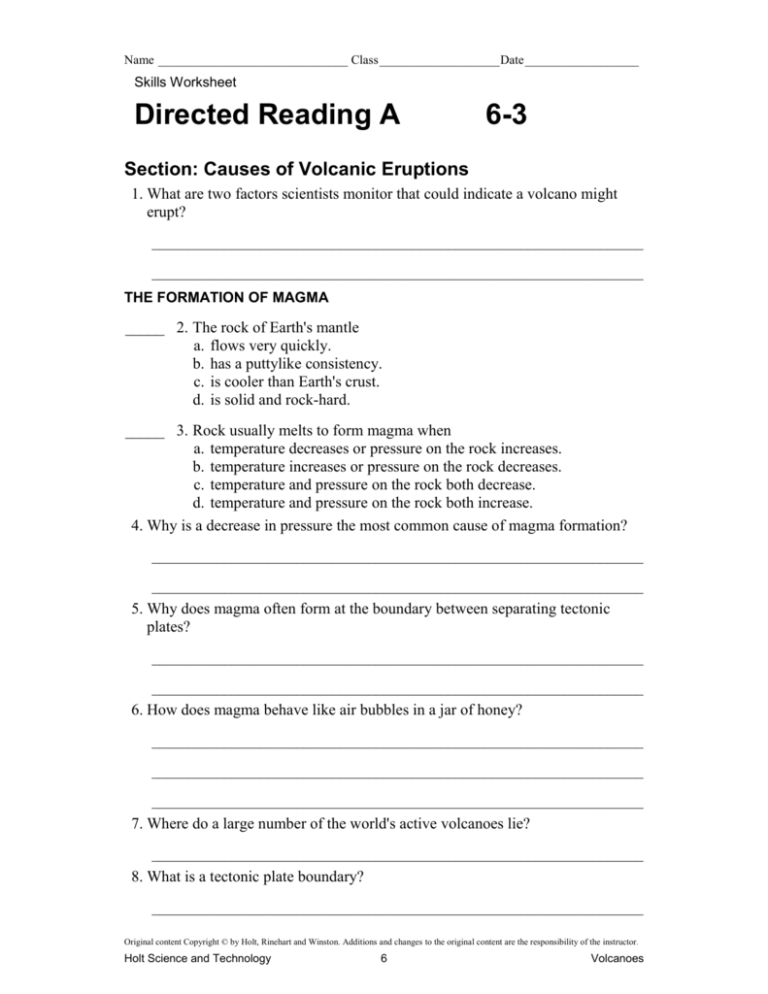
Name ______________________________ Class ___________________ Date __________________ Skills Worksheet Directed Reading A 6-3 Section: Causes of Volcanic Eruptions 1. What are two factors scientists monitor that could indicate a volcano might erupt? ____________________________________________________________________ ____________________________________________________________________ THE FORMATION OF MAGMA _____ 2. The rock of Earth's mantle a. flows very quickly. b. has a puttylike consistency. c. is cooler than Earth's crust. d. is solid and rock-hard. _____ 3. Rock usually melts to form magma when a. temperature decreases or pressure on the rock increases. b. temperature increases or pressure on the rock decreases. c. temperature and pressure on the rock both decrease. d. temperature and pressure on the rock both increase. 4. Why is a decrease in pressure the most common cause of magma formation? ____________________________________________________________________ ____________________________________________________________________ 5. Why does magma often form at the boundary between separating tectonic plates? ____________________________________________________________________ ____________________________________________________________________ 6. How does magma behave like air bubbles in a jar of honey? ____________________________________________________________________ ____________________________________________________________________ ____________________________________________________________________ 7. Where do a large number of the world's active volcanoes lie? ____________________________________________________________________ 8. What is a tectonic plate boundary? ____________________________________________________________________ Original content Copyright © by Holt, Rinehart and Winston. Additions and changes to the original content are the responsibility of the instructor. Holt Science and Technology 6 Volcanoes Name ______________________________ Class ___________________ Date __________________ Directed Reading A continued 9. How is magma formation and movement affected at tectonic plate boundaries? ____________________________________________________________________ WHEN TECTONIC PLATES SEPARATE _____ 10. Tectonic plates move away from each other at a a. rift zone. b. divergent boundary. c. convergent boundary. d. magma chamber. _____ 11. An area of deep cracks that forms between two tectonic plates that are pulling away from each other is a a. divergent boundary. b. mantle rock. c. crater column. d. rift zone. _____ 12. Lava from undersea rift zones produces volcanoes and mountain chains called a. the Ring of Fire. b. subduction zones. c. hot spots. d. mid-ocean ridges. 13. How does magma form at a divergent boundary? ____________________________________________________________________ ____________________________________________________________________ 14. How does new oceanic crust form at a divergent boundary? ____________________________________________________________________ ____________________________________________________________________ WHEN TECTONIC PLATES COLLIDE _____ 15. A convergent boundary is a place where a. tectonic plates move side by side. b. oceanic crust moves away from continental crust. c. continental crust is subducted under oceanic crust. d. tectonic plates collide with each other. Original content Copyright © by Holt, Rinehart and Winston. Additions and changes to the original content are the responsibility of the instructor. Holt Science and Technology 7 Volcanoes Name ______________________________ Class ___________________ Date __________________ Directed Reading A continued _____ 16. Subduction is the movement of one tectonic plate a. against another. b. over another. c. under another. d. away from another. _____ 17. As descending oceanic crust scrapes past the continental crust a. its temperature and pressure increase. b. it forms a lava fountain. c. it forms a volcano. d. its temperature and pressure decrease. 18. What happens to mantle rock when descending oceanic crust scrapes past continental crust, causing the temperature and pressure to increase? ____________________________________________________________________ ____________________________________________________________________ ____________________________________________________________________ ____________________________________________________________________ HOT SPOTS _____ 19. The Hawaiian Islands are located a. along a tectonic plate boundary. b. far from any plate boundary. c. over a lava fountain. d. on lava plateaus. 20. What are hot spots? ____________________________________________________________________ ____________________________________________________________________ 21. What is a mantle plume? ____________________________________________________________________ PREDICTING VOLCANIC ERUPTIONS Match the correct description with the correct term. Write the letter in the space provided. _____ 22. has not erupted in recorded history _____ 23. has not erupted recently, but may erupt in the future a. active volcano b. dormant volcano c. extinct volcano _____ 24. is erupting now Original content Copyright © by Holt, Rinehart and Winston. Additions and changes to the original content are the responsibility of the instructor. Holt Science and Technology 8 Volcanoes Name ______________________________ Class ___________________ Date __________________ Directed Reading A continued 25. What happens to the number and intensity of small earthquakes just before an eruption? ____________________________________________________________________ ____________________________________________________________________ 26. What may be indicated by changes in the ratio of sulfur dioxide to carbon dioxide in volcanic gases? ____________________________________________________________________ ____________________________________________________________________ 27. What may be indicated by a bulge in the side of a volcano? ____________________________________________________________________ ____________________________________________________________________ 28. What are two methods scientists use to detect changes in a volcano's slope that may signal an eruption? ____________________________________________________________________ ____________________________________________________________________ 29. How are satellite images used to predict volcanic eruptions? ____________________________________________________________________ ____________________________________________________________________ ____________________________________________________________________ ____________________________________________________________________ Original content Copyright © by Holt, Rinehart and Winston. Additions and changes to the original content are the responsibility of the instructor. Holt Science and Technology 9 Volcanoes
